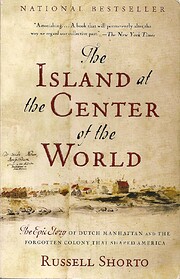

Cliquer sur une vignette pour aller sur Google Books.
|
Chargement... The Island at the Center of the World: The Epic Story of Dutch Manhattan and the Forgotten Colony That Shaped America (édition 2005)par Russell Shorto (Auteur)
Information sur l'oeuvreThe Island at the Center of the World: The Epic Story of Dutch Manhattan and the Forgotten Colony That Shaped America par Russell Shorto

Actuellement, il n'y a pas de discussions au sujet de ce livre.   ) )This is one of those nonfiction books that is somewhat boring at times but contains so much fascinating material that it pays to power through. The Island at the Center of the World by Russell Shorto examines the colony of New Netherlands and takes the perspective that history has skimmed over the Dutch influence on the United States. Shorto gives readers the background on known figures like Minuit and Stuyvesant, but also some forgotten figures like van der Donck through forgotten documents previously untranslated. He weaves in European history and world events to place the founding of New York solidly in history. I just finished reading The Island at the Center of the World::The Epic Story of Dutch Manhattan and the Forgotten Colony That Shaped America by Russell Shorto. The book is an excellent history of an overlooked but apparently crucial period of American history; the Dutch heritage of New York City, Albany and other adjacent lands. Most American history assumes an Anglo-centric perspective. That perspective is far from wrong, since the English dominated even the earliest colonization of what is now the United States, from the Georgia-Florida border through Virginia and to some extent Maryland, and from Maine partway through modern Connecticut. In between lay "the Middle Colonies", or what became New York, New Jersey, Pennsylvania, and Delaware. Maryland is a special case, a Catholic island in the middle of Protestant America but I digress. The Middle Colonies also featured a strong Swedish presence in what is now Delaware, southern New Jersey and Southeastern Pennsylvania. The tumultuous history of "New Sweden" is discussed extensively in the book. The book's main geographic focus is what was known as "Nieuw Amsterdam", later New York City and Fort Orange, later Albany. The book's main human focus is Adriaen van der Donck, of whom I was aware mostly for the fact that Yonkers, a city bordering New York City was named after him. In modern terms he would be understood as a "lawyer's lawyer." The profession of law did not exist in a modern sense in those days. He was dogmatic in his insistence on the rule of law. He was sometimes an ally and sometimes a bitter enemy of the far more famous Peter Stuyvesant. The book's main argument is that while Dutch rule did not survive, New York City's underlying tradition of tolerance did survive and indeed spread throughout the nation, though imperfectly. The author states, on Page 125-6 "(w)e should be clear, however, about the meaning of tolerance, which had nothing to do with 'celebrating diversity' -- a concept that would have been seen as sheer loopiness in the seventteenth century. 'Putting up with' was probably closer to the mark. If this sounds wan, consider that in Germany as of the time an estimated forty percent of the populated died due to the unholy enmeshment of religious intolerance and politics that gave rise to the 'Thirty Years' War' (in the city of Magdeburg only, thirty thousand were killed in a single day." The book does argue that the flood of people coming to the New World, and largely to New York, came as a result of the mindless massacres and the narrow-mindedness that spawned those. My minor quibbles, and why I give it "four stars"; certain literary flourishes are clearly invented. How does he know, for example, that after giving a presentation of various "Remonstrances" Adriaen van der Donck turned with a "pirouette" as he departed? This historical device is common, and somewhat lamentable. However, it does add to the book's readability. I highly recommend this book. This book has lots of history I didn't know and is brilliantly written, a combination that makes for a great read. Sholto's book, which appeared in 2005, was based on masses of material from the period of Dutch rule that had only recently been translated, adding a great deal to what was know about the era. The book shows that the Dutch, who only ruled Manhattan from 1624 to 1664, established a thriving commercial center and an emerging society. It challenges the "Establish Version" of American history, which focusses so intently on the Pilgrims and other English Puritan groups in New England. Sholto makes history truly dramatic, bringing historical figures to vibrant life, and showing through them how the pressures and ideas of the time were expressed. His writing is brilliant, a joy to read. A terrific read. aucune critique | ajouter une critique
Appartient à la série éditorialePrix et récompenses
Références à cette œuvre sur des ressources externes.
|
Discussion en coursAucunCouvertures populaires
 Google Books — Chargement... Google Books — Chargement...GenresClassification décimale de Melvil (CDD)974.7102History and Geography North America Northeastern U.S. New York New York (city)Classification de la Bibliothèque du CongrèsÉvaluationMoyenne: (4.13) (4.13)
Est-ce vous ?Devenez un(e) auteur LibraryThing. |
||||||||||||||||||||||||||||||||||||||||||||||||||||||||||||||||||||||||||||||||||||||||||||||||||||||||||||||||||||||||||||||||||||||